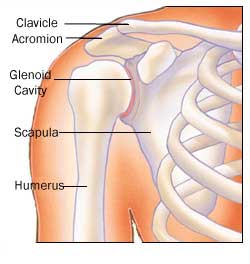
A shoulder arthroscopy is a procedure in which an arthroscope, an instrument with a light source and a small camera, is inserted into the elbow joint through a small incision. The procedure is used to examine and repair the tissue in and around the shoulder joint.
What is it?
When a shoulder injury or overuse of the joint results in persistent pain that does not respond to nonsurgical treatment, a shoulder arthroscopy may need to be performed to diagnose and treat the underlying problem. Common ailments that frequently require shoulder arthroscopies include rotator cuff repair, repair of ligaments, removal of inflamed tissue, and repair for recurrent shoulder dislocations.
What should I do to prepare?
Before a shoulder arthroscopy, a patient should meet with his or her doctor and discuss current medications, allergies, and past medical history. Patients are instructed to stop eating or drinking before midnight the day before surgery and to stop taking blood-thinning medications in advance of the procedure.
What happens during the process?
General anesthesia, the complete sedation of a patient, is used during this surgery. The patient is placed in a reclined position to allow the surgeon easy access to the shoulder. General anesthesia is administered by an anesthesiologist through an intravenous line so that the drugs are directly delivered to the veins and bloodstream. Once put under anesthesia, the surgeon will make small incisions in the shoulder and inject a sterile solution into the shoulder which expands the joint and makes it visible to doctors. The surgeon will diagnose the damage and then determine the necessary course of treatment.
What are the risks and potential complications?
Shoulder arthroscopy comes with associated risks that include but are not limited to:
- Excessive bleeding
- Blood clots
- Infection
- Nerve damage
Disclaimer:
All GlobeHealer Site content, including graphics, images, logos, and text, among other materials on the site are only for education purposes. This content is not intended to be a substitute for professional medical advice, and you should always contact your physician or qualified health provider for information regarding your health. Information on this site regarding the overview, diagnosis, and treatment of any kind should be looked at, in addition to the advice and information of your health care professional. Do not disregard medical advice or delay seeking treatment or medical advice due to information found on the GlobeHealer site.
If there is even the possibility that you may have a medical emergency, seek treatment, call your doctor, or call your local emergency telephone number immediately. GlobeHealer does not endorse being the first line of communication in case of emergency and does not endorse any specific test, physician, facility, product, procedure, opinion, or other information that is or may be mentioned on this site or affiliated entities. Reliance of any and all information provided by GlobeHealer, its employees, affiliations, others appearing on the Site under the invitation of GlobeHealer, or visitors of the site is solely at your own risk and is not the responsibility of GlobeHealer.
Image Source: https://commons.wikimedia.org/wiki/File:Rotatorcuff.jpg
